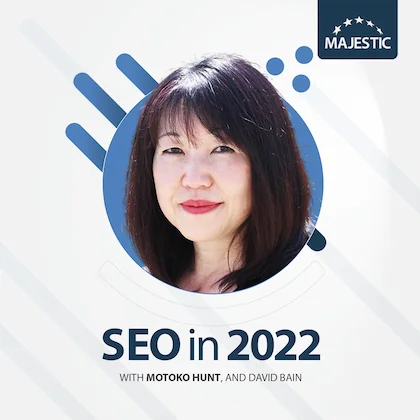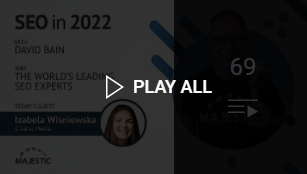-
Site Explorer
- Majestic
- Summary
- Ref Domains
- Backlinks
 New
New Lost
Lost- Context
- Anchor Text
- Pages
- Topics
- Link Graph
- Related Sites
- Advanced Tools
- Author ExplorerBeta
- Summary
- Similar Profiles
- Profile Backlinks
- Attributions
- Compare
-
Link Tools
- My Majestic
- Recent Activity
- Reports
- Campaigns
- Verified Domains
- OpenApps
- API Keys
- Keywords
- Keyword Generator
- Keyword Checker
- Search Explorer
- Link Tools
- Bulk Backlinks
- Neighbourhood Checker
- Submit URLs
- Experimental
- Index Merger
- Link Profile Fight
- Mutual Links
- Solo Links
- PDF Report
- Typo Domain
- Free SEO Tools
-
Support
- Blog

- Support
- Get started
- Tools
- Subscriptions & Billing
- FAQs
- Glossary
- How To Videos
- API Reference Guide

- Contact Us
- About Backlinks and SEO
- SEO in 2024
- Link Building Guides
- Webinars
- Blog
Stop reacting to each Google update and instead, pay attention to local audiences
Motoko Hunt
When you run a big, international website, it's easy to forget about the specific requirements and desires of local audiences - however, if you don't personalise experiences enough for local audiences, you could be leaving a lot of money on the table.

Stop reacting to each Google update and instead, pay attention to local audiences
Motoko says: "Stop reacting to every single Google update. It is important to monitor the updates, and how they might impact your website's performance, but you need to step back and consider your audience. Don't worry so much about what Google is doing or what Google wants. Make sure that you are not overlooking how your customer base is responding to the changes you make, and whether those changes are actually helping to grow the business. At the end of the day, the SEO work that gets put into a website is there to grow the business for the company. That's the ultimate goal. We need to rethink what we are prioritising, and make sure that it's translating into business growth."
Should you focus on the way that users interact with websites, and the signals that get back to Google because of that?
"Google's perception is important, but the key is not just ranking number one in search results - it's that whatever changes you make are helping to grow the business. Your changes need to be translating into sales, conversion, or whichever measurements are important to your KPIs.
Many people have been focusing on adding more content to their websites, and in content optimization, which is a good thing. However, often companies are pumping out new content, focussed on keywords with high volume, that only slightly relate to their business. You might rank number one there, but if it's not something that is closely related to your business, and your audience, it's not going to immediately translate into business growth. Content creation requires a lot of resources, manpower, and money. After a while, not translating that significant cost into business growth is just not sustainable.
When you do keyword or topic research, organise the terms and the content topics into different groups and then prioritise those that are closer to conversion. You might see a broad, high-volume term, but if you don't think it's going to convert, put it as a low priority. Focus on high-priority keywords, where adding content will help to grow the business. We see good conversion from articles that may not have product, or service, information directly on the page. That information already exists on other pages on the website, but by adding supportive content around the product or service, you can target the different needs of your audience. People that are interested in your products might be trying to solve a specific problem, or find additional information related to the product. Content that targets these user needs can turn a potential customer into a customer."
How do you decide if a keyword phrase is likely to convert?
"You need to do extensive research on a content topic. Look at search volume, keyword tools and things like that - but mainly you should listen to your customers. Pay attention to feedback from events that you have for your customer base, or from conferences. Gather information on what your potential customers want to know, what kind of concerns they have, and what additional products they are interested in. Customer support feedback will be helpful too.
When you have new clients, particularly B2B, you should sign up for newsletters in that industry. Start reading articles to see what kind of information the engineers, manufacturers, or owners are interested in. You should be stepping forward and looking ahead. Try to see what content the customer is looking for and put that content onto your websites before your competitors do. Let them keep chasing high search volume keywords. You need to do high level market research, instead of just relying on keyword information out of a tool.
Also, create additional supportive articles, so that you can start to build a content area with multiple pieces of information that support each other. That will help sell products and services because it's what potential customers are interested in - they want to understand and learn about what is new with the business."
What's your definition of a local audience that you should be researching and targeting?
"Your local audience is your target market. SEOs work with global businesses and global websites. A local audience, in this context, could be in multiple countries, or even multiple markets - it is the niche audience to which you are highly relevant.
Companies often do extensive research on the markets that they already know, but don't think far enough when targeting new audiences. Especially when Western businesses are trying to tap into the Asian market. They may translate the content into the right language, but they don't do any additional research to localise the content. You need to understand how your audience in Korea, China, or Japan, might be different from your audience in France or Germany. An American business may do well in Europe but fail miserably when they try to tap into an Asian market because they just copy and paste their content.
You cannot just translate the keywords you want to rank for and then optimise the content for what you find. That might not be the keyword that people in another market are interested in. The articles, topics, and information that interests that audience will be different - even the industry regulations or laws will change across countries. The market will therefore be seeking different resources."
Is it a mistake to spend time working on short keywords before you have targeted the phrases that will resonate with the local marketplace?
"Generally, you already have the content for short-tail keyword phrases and translating that content will be the first step when reaching out to new countries or new markets. The next step will be optimising that existing content, and this is when you can invest the time to target the local audience. Add other resources and new content and start thinking about additional articles for the local market. That's the right time to also carry out your local keyword research.
The localization process will especially make a big difference for a large site, where you may not be able to translate 100% of your content at once. Even a small amount of local interest research will help you to prioritise which content you should be localising first. Of course, you should start with your product and service pages, but the market research will help you to identify what supporting content is important to focus on next. You want to be localising the content that is going to have the most impact for your business."
What's something that SEOs should stop doing to focus more time on high-quality research into their target market, and identifying relevant keywords?
"When you are planning to create content strategies, don't just find new keywords with high search volume and create new content based on that. Sit back and develop a plan. Make sure that your content creation is not just based on search volume, or popular keywords, but prioritises the goals of the business. It should be based on the likelihood of the user converting, or on helping and supporting a customer to convert. Reallocate resources and budget into determining what will have the right impact. Otherwise, you spend the money and resources on generating large amounts of new content, for its own sake, that doesn't help the business to grow. This will help you to spend your time and your budget much more effectively."
You can find Motoko Hunt over at AJPR.com.
Choose Your Own Learning Style
 Video
Video
If you like to get up-close with your favourite SEO experts, these one-to-one interviews might just be for you.
Watch all of our episodes, FREE, on our dedicated SEO in 2022 playlist.
 Podcast
Podcast
Maybe you are more of a listener than a watcher, or prefer to learn while you commute.
SEO in 2022 is available now via all the usual podcast platforms
Don't miss out
Opt-in to receive email updates.
It's the fastest way to find out more about SEO in 2025.
Could we improve this page for you? Please tell us





